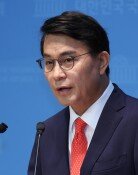Bill Gates, Edward Jung visit Pres. Park
Bill Gates, Edward Jung visit Pres. Park
Posted April. 24, 2013 02:50,
President Park Geun-hye met Bill Gates, co-chair of Bill & Melinda Gates Foundation, at the President Office Tuesday. Media competitively reported on their meeting. However, no one was paying attention to the man with a ponytail sitting next to Gates. He was Edward Jung, CEO of patent acquisition firm Intellectual Ventures and former Microsoft chief technology officer.
Intellectual Ventures earns money from directly obtaining patents or buying patents and earning money from license fee. It files lawsuit to companies if license fee negotiations don`t go well. These firms are called "patent trolls." Since getting license fee is the main purpose, they are dubbed "trolls" that drag on companies. There is yet no case of Intellectual Ventures filing lawsuit against a Korean firm, but main targets are manufacturing companies such as Samsung Electronics and LG Electronics.
Bill Gates is a major investor of Intellectual Ventures, which was established in 2000. While the firm mainly focuses on energy patents, it also owns TerraPower, a firm where Gates works as chairman. According to foreign media, Gates has invested tens of millions of dollars on TerraPower, which develops next-generation nuclear technology. If the firm succeeds in commercializing its technology, Intellectual Ventures will gain patent earnings, a considerable amount of which will likely go to Bill Gates.
In a meeting with President Park, Gates said creative economy is an excellent idea and spoke about plans to commercialize next-generation nuclear facility. On a critical perspective, Gates might have intended to create chances for patent sales.
There is no intention to criticize Gates. Boldly investing in ideas that can change the world is key to entrepreneurial spirit. Consequently, people will be better off. Even if Gates earn huge wealth through this, he deserves it.
How about Korean companies? Affiliates engaged in intra-group deals are considered as criminals if more than 30 percent of stakes in them are owned by conglomerate heads. Coupled with other economic democratization bills that are being discussed in parliament, all these are restricting economic activities of companies. Some large companies that took advantage of illegal intra-group deals in family succession caused this situation, some say. However, excess regulation could hamper entrepreneurial spirit that should otherwise boom in a creative economy era.
Korean companies must feel mixed watching Bill Gates talking with President Park with the founder of a patent troll right beside him.
nex@donga.com







